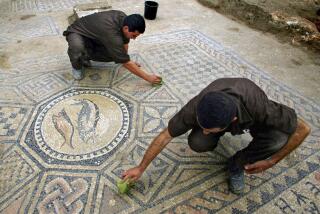A Wondering World Awaits the Dead Sea Scrolls : Antiquities: The custody flap over their release is foolish, even pernicious to scholarship.
- Share via
More surprising than the Huntington Library’s courageous decision to release its photographs of the Dead Sea Scrolls--kept secret now for nearly 40 years--is the inexplicable reaction of the Israel Antiquities Authority: Instead of applause, it has reacted with unrestrained fury combined with the threat of a lawsuit.
It is, of course, a lawsuit that cannot be won. Even if it found some judge foolish enough to enjoin Huntington from allowing all scholars access to these ancient documents, what would the Antiquities Authority have won? It would only preserve the secrecy--and bring down on its head the condemnation of the world. Some victory.
Why does the authority insist on secrecy and monopoly instead of intellectual freedom and competition among scholars?
One American scholar, Bruce Zuckerman, the acting director of the Ancient Biblical Manuscript Center in Claremont, Calif., (which has another set of scroll photographs that scholars cannot see) said he was concerned that someone might depict the Dead Sea Scrolls on T-shirts. Because of such a disrespectful possibility, Zuckerman would preserve the secrecy imposed by the team of editors that has controlled access for the last 40 years.
Magen Broshi, the curator of the Shrine of the Book in Jerusalem, where many of the Dead Sea Scrolls are housed, takes another tack. He is concerned that if all scholars have access to these secret scrolls, “It would flood the market and swamp the area . . . with third- and fourth- and fifth-rate productions.” In short, only the monopolists in the in-group are competent.
These arguments are merely foolish--vain efforts to find some rationalization for maintaining the monopoly. But the argument put forward by Gen. Amir Drori, the director of the Israel Antiquities Authority, is worse than that. His defense is more pernicious, even dangerous.
According to Drori, making the scrolls available to anyone would put the possibility of a “definitive interpretation” at risk. In other words, Drori wants secrecy maintained until the monopolists can come up with their own “definitive interpretation.”
Let us have no part of this. Let us cast our vote for freedom of scholarship. Let us place our faith in the belief that truth will prevail in the marketplace of ideas--if only the competition of ideas remains unfettered.
Gen. Drori, please don’t try to impose your orthodoxy on a world of imaginative, independent, free-thinking scholars. We want no part of your “definitive interpretation.” We want to make up our own minds, based on all the evidence.
Whether we will ever reach a “definitive interpretation” of the Dead Sea Scrolls is an open question. What is certain, however, is that today scholars are deeply divided over innumerable issues relating to the Dead Sea Scrolls--the origin and identification of the group that wrote them, how they relate to early Christianity and rabbinic Judaism and what the the scrolls tell us about the creation of the Hebrew Bible, to name just a few.
The way to learn more is to let in more light, not to continue a shroud of secrecy.
More to Read
Sign up for our Book Club newsletter
Get the latest news, events and more from the Los Angeles Times Book Club, and help us get L.A. reading and talking.
You may occasionally receive promotional content from the Los Angeles Times.










